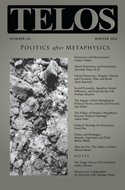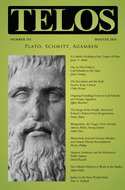By Michael Marder · Wednesday, February 13, 2013 Michael Marder’s “After the Fire: The Politics of Ashes” appears in Telos 161 (Winter 2012). Read the full version online at the Telos Online website, or purchase a print copy of the issue in our store.
 Two fires are kindled at the threshold of the metaphysical era, and both are extinguished, almost simultaneously, as soon as metaphysics exhausts itself (or else gets exhausted, tired, fatigued with itself) in its final Nietzschean inversion. The political reality of the twenty-first century is, as a whole, a comet tail of these ancient blazes that, until recently, seemed to be older than time itself, gave the impression of being eternal, undying, inextinguishable. How to find one’s bearings among the cinders and ashes of what the flames consumed? How to make sense—if make sense we must—of the burnt and smoldering remains, the traces of catastrophes, as much as of hopes and revolutionary desires, littering the horizons of the political today? Two fires are kindled at the threshold of the metaphysical era, and both are extinguished, almost simultaneously, as soon as metaphysics exhausts itself (or else gets exhausted, tired, fatigued with itself) in its final Nietzschean inversion. The political reality of the twenty-first century is, as a whole, a comet tail of these ancient blazes that, until recently, seemed to be older than time itself, gave the impression of being eternal, undying, inextinguishable. How to find one’s bearings among the cinders and ashes of what the flames consumed? How to make sense—if make sense we must—of the burnt and smoldering remains, the traces of catastrophes, as much as of hopes and revolutionary desires, littering the horizons of the political today?
Continue reading →
By Aryeh Botwinick · Friday, January 11, 2013 Aryeh Botwinick’s “Liberal Democracy, Negative Theory, and Circularity: Plato and Rawls” appears in Telos 161 (Winter 2012). Read the full version online at the Telos Online website, or purchase a print copy of the issue in our store.
 This paper argues that the best kind of philosophical defense of democracy is one that is worked out within the framework of negative theory. The phrase “negative theory” is being used on analogy with the term negative theology. Just as negative theology argues that we can only indefinitely say what God is not but cannot pinpoint in a positive sense what He is, so, too, negative theory advocates that we can only ceaselessly explore and highlight the limitations of reason, without being able to arrive at a positive content that is incontrovertible and uncontestable. This paper argues that the best kind of philosophical defense of democracy is one that is worked out within the framework of negative theory. The phrase “negative theory” is being used on analogy with the term negative theology. Just as negative theology argues that we can only indefinitely say what God is not but cannot pinpoint in a positive sense what He is, so, too, negative theory advocates that we can only ceaselessly explore and highlight the limitations of reason, without being able to arrive at a positive content that is incontrovertible and uncontestable.
Continue reading →
By James V. Schall · Tuesday, January 24, 2012 James V. Schall’s “A Catholic Reading of the Gorgias of Plato” appears in Telos 157 (Winter 2011). Read the full version online at the TELOS Online website, or purchase a print copy of the issue here.
 The Gorgias of Plato is of particular interest to political philosophy. Not only is there a detailed discussion of punishment and oratory, but also of practical political ways of action and their foundation. This dialogue is of particular worth for the Roman Catholic notion of the relation of reason and revelation. Political life leaves us with the notion that not all crimes are punished, nor are all good deeds rewarded. This fact leaves the Platonic concern of whether the world is created in injustice. The myth at the end of the Gorgias suggests that politicians are the ones most likely to cause extensive damage and evil in the world. It also argues that unless such deeds are suffered for, thus righting the principle, they will be punished. This consideration naturally leads to the issue of resurrection, an issue about which even Marxist-oriented philosophers like Adorno and Horkheimer saw the logic. The Gorgias of Plato is of particular interest to political philosophy. Not only is there a detailed discussion of punishment and oratory, but also of practical political ways of action and their foundation. This dialogue is of particular worth for the Roman Catholic notion of the relation of reason and revelation. Political life leaves us with the notion that not all crimes are punished, nor are all good deeds rewarded. This fact leaves the Platonic concern of whether the world is created in injustice. The myth at the end of the Gorgias suggests that politicians are the ones most likely to cause extensive damage and evil in the world. It also argues that unless such deeds are suffered for, thus righting the principle, they will be punished. This consideration naturally leads to the issue of resurrection, an issue about which even Marxist-oriented philosophers like Adorno and Horkheimer saw the logic.
Continue reading →
By Russell A. Berman · Monday, December 19, 2011 Telos 157 (Winter 2011) is now available for purchase here.
 The political disorder grows ever thicker. As of this writing, the European financial crisis seems as far away from resolution as ever, although the same complaint might have pertained three months ago nor is the diagnosis likely to lose its validity three months hence. The eurozone insists on tumbling toward an economic catastrophe that may drag the rest of the world down as well. Meanwhile prospects for a liberalizing democracy in the former Communist empire have largely vanished from living (or incarcerated) memory, and the trajectory of the Arab Spring poses more questions than answers. To be sure, things may still take a turn for the good, and the ignominious ends of some of the dictators merit celebration. Yet deserving candidates for violent overthrow and execution remain in power, in Damascus and Tehran, terrorizing their populations, amidst a larger civil war throughout the Middle East. Much of this disorder has profound local roots, stemming from competition among alternative religious traditions, political models, and economic agenda. But some of the instability results as well from the loss of ballast in the wake of the American retreat, itself a symptom of the chaos of American politics. The pre-primary period optimizes neither political virtue nor sober leadership, but even with that qualification, this lead-up to the 2012 electoral season stands out for its chilling hopelessness. It is hard to imagine a happy end to the story. The power of the state continues to expand, which undermines the integrity of individuals, but its capacity to influence the economy nonetheless diminishes. Disorder surrounds us, and the center gives way. Is there room for civic virtue? The political disorder grows ever thicker. As of this writing, the European financial crisis seems as far away from resolution as ever, although the same complaint might have pertained three months ago nor is the diagnosis likely to lose its validity three months hence. The eurozone insists on tumbling toward an economic catastrophe that may drag the rest of the world down as well. Meanwhile prospects for a liberalizing democracy in the former Communist empire have largely vanished from living (or incarcerated) memory, and the trajectory of the Arab Spring poses more questions than answers. To be sure, things may still take a turn for the good, and the ignominious ends of some of the dictators merit celebration. Yet deserving candidates for violent overthrow and execution remain in power, in Damascus and Tehran, terrorizing their populations, amidst a larger civil war throughout the Middle East. Much of this disorder has profound local roots, stemming from competition among alternative religious traditions, political models, and economic agenda. But some of the instability results as well from the loss of ballast in the wake of the American retreat, itself a symptom of the chaos of American politics. The pre-primary period optimizes neither political virtue nor sober leadership, but even with that qualification, this lead-up to the 2012 electoral season stands out for its chilling hopelessness. It is hard to imagine a happy end to the story. The power of the state continues to expand, which undermines the integrity of individuals, but its capacity to influence the economy nonetheless diminishes. Disorder surrounds us, and the center gives way. Is there room for civic virtue?
Continue reading →
|
|
 Two fires are kindled at the threshold of the metaphysical era, and both are extinguished, almost simultaneously, as soon as metaphysics exhausts itself (or else gets exhausted, tired, fatigued with itself) in its final Nietzschean inversion. The political reality of the twenty-first century is, as a whole, a comet tail of these ancient blazes that, until recently, seemed to be older than time itself, gave the impression of being eternal, undying, inextinguishable. How to find one’s bearings among the cinders and ashes of what the flames consumed? How to make sense—if make sense we must—of the burnt and smoldering remains, the traces of catastrophes, as much as of hopes and revolutionary desires, littering the horizons of the political today?
Two fires are kindled at the threshold of the metaphysical era, and both are extinguished, almost simultaneously, as soon as metaphysics exhausts itself (or else gets exhausted, tired, fatigued with itself) in its final Nietzschean inversion. The political reality of the twenty-first century is, as a whole, a comet tail of these ancient blazes that, until recently, seemed to be older than time itself, gave the impression of being eternal, undying, inextinguishable. How to find one’s bearings among the cinders and ashes of what the flames consumed? How to make sense—if make sense we must—of the burnt and smoldering remains, the traces of catastrophes, as much as of hopes and revolutionary desires, littering the horizons of the political today?  The Gorgias of Plato is of particular interest to political philosophy. Not only is there a detailed discussion of punishment and oratory, but also of practical political ways of action and their foundation. This dialogue is of particular worth for the Roman Catholic notion of the relation of reason and revelation. Political life leaves us with the notion that not all crimes are punished, nor are all good deeds rewarded. This fact leaves the Platonic concern of whether the world is created in injustice. The myth at the end of the Gorgias suggests that politicians are the ones most likely to cause extensive damage and evil in the world. It also argues that unless such deeds are suffered for, thus righting the principle, they will be punished. This consideration naturally leads to the issue of resurrection, an issue about which even Marxist-oriented philosophers like Adorno and Horkheimer saw the logic.
The Gorgias of Plato is of particular interest to political philosophy. Not only is there a detailed discussion of punishment and oratory, but also of practical political ways of action and their foundation. This dialogue is of particular worth for the Roman Catholic notion of the relation of reason and revelation. Political life leaves us with the notion that not all crimes are punished, nor are all good deeds rewarded. This fact leaves the Platonic concern of whether the world is created in injustice. The myth at the end of the Gorgias suggests that politicians are the ones most likely to cause extensive damage and evil in the world. It also argues that unless such deeds are suffered for, thus righting the principle, they will be punished. This consideration naturally leads to the issue of resurrection, an issue about which even Marxist-oriented philosophers like Adorno and Horkheimer saw the logic. 

